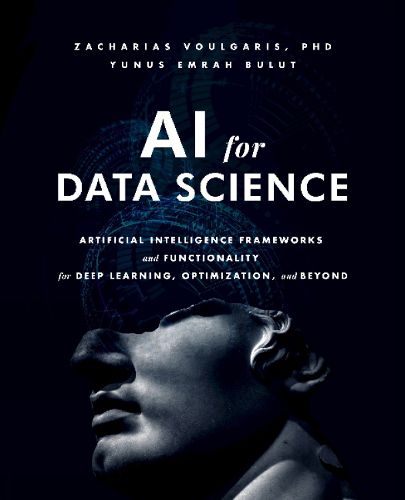Readings Newsletter
Become a Readings Member to make your shopping experience even easier.
Sign in or sign up for free!
You’re not far away from qualifying for FREE standard shipping within Australia
You’ve qualified for FREE standard shipping within Australia
The cart is loading…






This title is printed to order. This book may have been self-published. If so, we cannot guarantee the quality of the content. In the main most books will have gone through the editing process however some may not. We therefore suggest that you be aware of this before ordering this book. If in doubt check either the author or publisher’s details as we are unable to accept any returns unless they are faulty. Please contact us if you have any questions.
Master the approaches and principles of Artificial Intelligence (AI) algorithms, and apply them to Data Science projects with Python and Julia code. Aspiring and practicing Data Science and AI professionals, along with Python and Julia programmers, will practice numerous AI algorithms and develop a more holistic understanding of the field of AI, and will learn when to use each framework to tackle projects in our increasingly complex world. The first two chapters introduce the field, with Chapter 1 surveying Deep Learning models and Chapter 2 providing an overview of algorithms beyond Deep Learning, including Optimization, Fuzzy Logic, and Artificial Creativity. The next chapters focus on AI frameworks; they contain data and Python and Julia code in a provided Docker, so you can practice. Chapter 3 covers Apaches MXNet, Chapter 4 covers TensorFlow, and Chapter 5 investigates Keras. After covering these Deep Learning frameworks, we explore a series of optimization frameworks, with Chapter 6 covering Particle Swarm Optimization (PSO), Chapter 7 on Genetic Algorithms (GAs), and Chapter 8 discussing Simulated Annealing (SA). Chapter 9 begins our exploration of advanced AI methods, by covering Convolutional Neural Networks (CNNs) and Recurrent Neural Networks (RNNs). Chapter 10 discusses optimization ensembles and how they can add value to the Data Science pipeline. Chapter 11 contains several alternative AI frameworks including Extreme Learning Machines (ELMs), Capsule Networks (CapsNets), and Fuzzy Inference Systems (FIS). Chapter 12 covers other considerations complementary to the AI topics covered, including Big Data concepts, Data Science specialization areas, and useful data resources to experiment on. A comprehensive glossary is included, as well as a series of appendices covering Transfer Learning, Reinforcement Learning, Autoencoder Systems, and Generative Adversarial Networks. There is also an appendix on the business aspects of AI in data science projects, and an appendix on how to use the Docker image to access the books data and code. The field of AI is vast, and can be overwhelming for the newcomer to approach. This book will arm you with a solid understanding of the field, plus inspire you to explore further.
$9.00 standard shipping within Australia
FREE standard shipping within Australia for orders over $100.00
Express & International shipping calculated at checkout
This title is printed to order. This book may have been self-published. If so, we cannot guarantee the quality of the content. In the main most books will have gone through the editing process however some may not. We therefore suggest that you be aware of this before ordering this book. If in doubt check either the author or publisher’s details as we are unable to accept any returns unless they are faulty. Please contact us if you have any questions.
Master the approaches and principles of Artificial Intelligence (AI) algorithms, and apply them to Data Science projects with Python and Julia code. Aspiring and practicing Data Science and AI professionals, along with Python and Julia programmers, will practice numerous AI algorithms and develop a more holistic understanding of the field of AI, and will learn when to use each framework to tackle projects in our increasingly complex world. The first two chapters introduce the field, with Chapter 1 surveying Deep Learning models and Chapter 2 providing an overview of algorithms beyond Deep Learning, including Optimization, Fuzzy Logic, and Artificial Creativity. The next chapters focus on AI frameworks; they contain data and Python and Julia code in a provided Docker, so you can practice. Chapter 3 covers Apaches MXNet, Chapter 4 covers TensorFlow, and Chapter 5 investigates Keras. After covering these Deep Learning frameworks, we explore a series of optimization frameworks, with Chapter 6 covering Particle Swarm Optimization (PSO), Chapter 7 on Genetic Algorithms (GAs), and Chapter 8 discussing Simulated Annealing (SA). Chapter 9 begins our exploration of advanced AI methods, by covering Convolutional Neural Networks (CNNs) and Recurrent Neural Networks (RNNs). Chapter 10 discusses optimization ensembles and how they can add value to the Data Science pipeline. Chapter 11 contains several alternative AI frameworks including Extreme Learning Machines (ELMs), Capsule Networks (CapsNets), and Fuzzy Inference Systems (FIS). Chapter 12 covers other considerations complementary to the AI topics covered, including Big Data concepts, Data Science specialization areas, and useful data resources to experiment on. A comprehensive glossary is included, as well as a series of appendices covering Transfer Learning, Reinforcement Learning, Autoencoder Systems, and Generative Adversarial Networks. There is also an appendix on the business aspects of AI in data science projects, and an appendix on how to use the Docker image to access the books data and code. The field of AI is vast, and can be overwhelming for the newcomer to approach. This book will arm you with a solid understanding of the field, plus inspire you to explore further.